
|
Alexander the Great: The Invisible Enemy - A Biography
Paperback
Main Details
| Title |
Alexander the Great: The Invisible Enemy - A Biography
|
| Authors and Contributors |
By (author) John Maxwell O'Brien
|
| Physical Properties |
| Format:Paperback | | Pages:360 | | Dimensions(mm): Height 234,Width 156 |
|
| Category/Genre | European history
Biographies: Historical, Political and Military
World history - BCE to c 500 CE |
|---|
| ISBN/Barcode |
9780415106177
|
| Classifications | Dewey:938.107092 |
|---|
| Audience | | Undergraduate | | Postgraduate, Research & Scholarly | | Professional & Vocational | |
|---|
| Edition |
New edition
|
| Illustrations |
7 maps, 1 table
|
|
Publishing Details |
| Publisher |
Taylor & Francis Ltd
|
| Imprint |
Routledge
|
| Publication Date |
15 September 1994 |
| Publication Country |
United Kingdom
|
Description
Alexander and Dionysus:The Invisible Enemy differs from other biographies of Alexander in its assessment of the role of alcohol in his life. O'Brien uses the figure of Dionysus as a symbol of the destructive effects of alchohol on Alexander's psyche. The deity serves as an agent through whom a cluster of ambivalent considerations is explored: the heroic and the Dionysiac, the rational and the irrational, male and female, sanity and madness. Alexander's story unfolds as a tragedy in the Aristotelian sense of the word. Alexander is treated from birth to death as a total personality. His culture, his gods, his parents, his aspirations, his exploits, his fears, his insecurities, his sexuality, his drinking, and the psychology of alcoholism are examined from an interdisciplinary perspective. The book utilises recent discoveries in archaeology and incorporates new interpretations from anthropology, psychology, mythology, philosphy and literature. The historical context provides a structure for these diverese insights. Key passages in the narratvie are illuminated by telling quotations from Homer and Euripides, the authors known to have constituted Alexander's favourite reading. John Maxwell O'Brien is thus also able to delineate broadly the thought processes of Greek antiquity.
Reviews"Alexander's story is compelling to lay audiences and scholars alike, with the pathos of an authentic Aristotelian tragedy. O'Brien writes with understanding and empathy, yet with resolute acceptance of the evidence."-"Minneapolis Star Tribune "Since the author maintains a consistent position of respectful belief in Greek mythology, as well as an immense knowledge of ancient Greek literature and history, we have a book that could indeed have been written 2,000 years ago. You don't often get a chance to read a book like this."-"The St. Louis Dispatch "This is a most interesting and valuable biography, not least because it provides such an extensive "Materialsammlung on Alexander as a human being."-Ernst A. Fredricksmeyer, University of Colorado "Suitable for a modern age . . . fair and balanced . . . The bibliography is the most complete ever assembled on modern Alexander scholarship and will prove useful to students and scholars alike."-"Choice "What happened to Alexander? O'Brien's answer is mesmerizing . . . he brings to the tale a sense of fatalism that Euripides would understand."-Paul A. Gilster, "The News and Observer
|